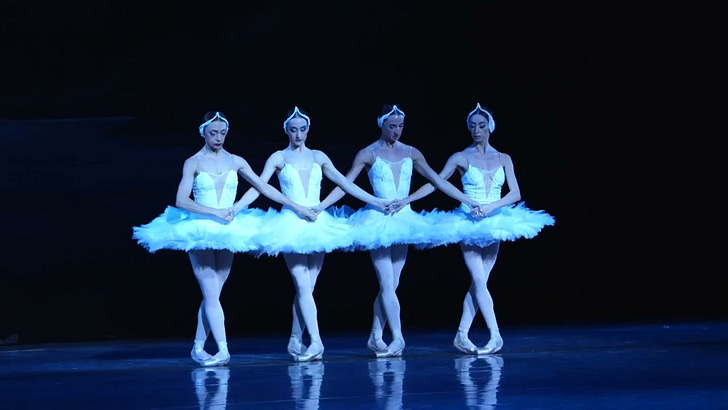First seen in the U.K. at the Edinburgh International Festival in 2008, the State Ballet of Georgia has waited a long time to make its London debut. It will arrive later this month with a lavish two-hour staging of Swan Lake, produced by Alexei Fadeyechev, a former star and director of the Bolshoi Ballet, and the ballerina Nina Ananiashvili, once his frequent partner and this troupe’s director since 2004.
Though the dance audience here seldom gets excited about unknown artists, the theatre will doubtless be full. Ballet has left town for the summer, and anyway, as George Balanchine said, “Call every ballet Swan Lake. People will come.”
When I interviewed Ananiashvili in 2008, she spoke about her priorities as a director and the values she hoped to instill in her dancers. Her comments provide an intriguing introduction to the coming performances.
§ § § § §
“Not a lot of people live in Tblisi, and we don’t have so many tourists. So it’s not like people come to see our opera house like at Covent Garden because they want to say , “I went to see Covent Garden.” Nearly the same audience comes to watch every performance.
“In the beginning I started to do classical ballets, because if you’re a classical company you cannot be without them. We love to perform these, for us it’s not old-fashioned. In my company they’re fighting each other to play these, because they are much more difficult to dance, and if you are good in a classical ballet you show your level.
“And each person who stages them gives them a new look. I have Alexei Fadeyechev productions, and I try to make the corps important. The corps is not like machinery people, they’re not circus, they’re not Chinese opera, they’re live people and they need to dance the corps’ dances live. So there’s a need to show them how to bring this out…to make sure this happens onstage.
“This winter we had a one-month tour in the United States and we performed Giselle in the university theatres there. And I thought, ‘For students it will be so boring to see this kind of ballet. Will they understand it?’ I asked them, “Is it boring, somebody in a long dress walking around and doing this pantomime?” And they said, “Absolutely not,” because they understood that it’s a story that can happen now and they were just watching how it was in a different century. This is exactly what we want to show. This is our feeling, our soul, our story that we show today. Even though we play it like people of other centuries, it’s still true.
“In my classical ballets, I’m very strong for taste. I love to keep Russian taste what it was and what my teachers taught me. Because I hate it, especially in classical ballets, when the taste of dance goes like kick legs up and do faces and too much this and too much that. What makes me sad about the Kirov Ballet and the Bolshoi, they start doing this now all the time, whether you need it or you don’t need it.
“We continue to invite choreographers to stage for us specially. We do three programs of Balanchine, [which] is fantastic training for the company because you start thinking differently about classical ballet. He gives you the idea that the classical ballet vocabulary is much more than you think about in Petipa’s ballets—it really helps a dancer to grow.
“Not because you change something in your performance when you dance other things, but these other things give you something else that maybe you can put into this performance. It’s like…When you read a lot of books, you don’t start talking differently. You talk the same, but your knowledge and your mind are much more than before the books, right? It’s like inside of you. It’s the same feeling in the ballet. As much you dance, as much you know; as much you know, as much you use. Everything goes in, and then you explode, it comes out.”
London Coliseum, August 28 to September 8. londoncoliseum.org
Bord Gáis Energy Theatre, Dublin, November 20-24. bordgaisenergytheatre.ie/shows-listing
Ananiashvili and Marcelo Gomes lead the company in Swan Lake, Japan, 2017

